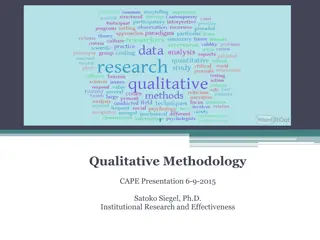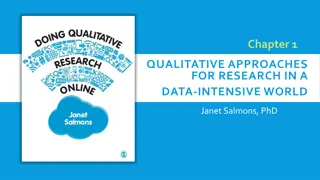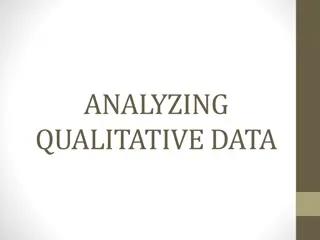Understanding Qualitative Data Analysis Methods
Exploring qualitative data analysis techniques such as Grounded Theory, Structured Coding, Thematic Analysis, and using tools like Nvivo to analyze large datasets. Emphasis is placed on ensuring rigor through iterative processes, understanding biases, and cross-checking themes for trustworthiness.
Download Presentation

Please find below an Image/Link to download the presentation.
The content on the website is provided AS IS for your information and personal use only. It may not be sold, licensed, or shared on other websites without obtaining consent from the author. Download presentation by click this link. If you encounter any issues during the download, it is possible that the publisher has removed the file from their server.
E N D
Presentation Transcript
Analysing Qualitative Data Dr. Michael Agnew & Dr. Cherie Woolmer MacPherson Institute
Analyzing qualitative data Grounded Theory: used in the social sciences (both in qualitative and quantitative research) to generate theory from a deep and rigorous analysis of the data Structured Coding: will typically begin with a list of codes or keywords according to the aims of the research/questions being asked Descriptive/Open Coding: codes generated only as one reads through and analyzes the data, looking for common emerging themes
Thematic Analysis Bryman (2004/2008) suggests: Stage 1: Reading the text as a whole Stage 2: Reading and marking the text (emerging keywords/codes) Stage 3: Coding the text and grouping the codes to themes Stage 4: Relating themes to the literature/theory Videos: https://www.youtube.com/watch?v=7X7VuQxPfpk&t=17s https://youtu.be/B_YXR9kp1_o
Ensuring rigour through analysis Notion of trustworthiness rather than validity and reliability (used in quantitative studies) Know the data listen, read, and re-read Iterative process- how do codes link with literature and your research questions? Be explicit about your own biases (positionality) and how these effect your interpretation Cross-check themes with others analyzing the same data

 undefined
undefined

























